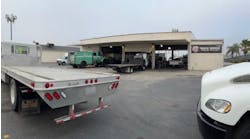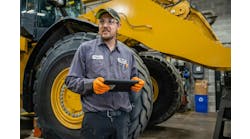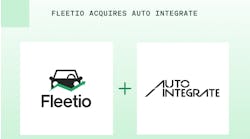Fleets' growing concerns include cost, efficiency, and sustainability, Shell Fleet Solutions says
It's no surprise that fleet management has evolved over the years, particularly with the rise of advanced technology such as telematics systems, including remote and in-cab devices. Commercial trucking has also seen the growth of emissions regulations, along with accompanying emissions-reduction technology, all of which make the role of the fleet manager more complex than ever before.
"Just in the last decade, fleet technology has drastically improved to the point where it's hard for fleet owners to ignore the efficiencies it provides their overall operations," said Jim Perkins, director of Shell Fleet Solutions U.S. "The amount of information available to fleet owners is expansive, but there is value in taking the time to make the data work for fleets to help save both time and money."
That can be more easily accomplished with a little help.
Perkins runs a group of fleet account managers that counsel fleets to help them achieve their goals. These fleets range from all sizes, primarily with vehicles in Classes 1-6, in all parts of the U.S. Because Perkins’ team interacts with such a wide range of fleets on a daily basis, his team gets a good look at issues and trends facing fleets today.
The top trends discussed among fleets are efficiency, safety, and total cost of ownership. Existing industry technologies can help fleets manage all three. However, these advances in technology require time to research and test within the fleet as well as the willingness and support from management to implement them. According to a Shell Fleet Solutions report, 34% of fleet managers think they would benefit from external support and advice to help them implement these technologies and navigate the transition from traditional powertrains to alternative fuel and electric vehicles.
See also: CES 2024: AVs, lidar, and tire technology
“These fleet managers have a lot on their plate,” Perkins told Fleet Maintenance's sister publication, FleetOwner. “They need somebody that can help them ... be more efficient with their time and energy and to help them achieve the goals that they're trying to achieve.”
Fleet concerns
One of the top trends identified by Perkins’ team was “first and foremost” the issue of costs, and managing fuel expenses is one of the most basic of these cost challenges. Shell Fleet Solutions offers fleets its Shell Fleet Navigator card, which helps manage fuel expenses by letting managers decide what items can and cannot be purchased with the card. It also provides reports on fuel spending and data that help them better manage fuel expenses. To give managers a transparent view of overall fuel expenses, these reports detail how much fuel is used by each vehicle, who is purchasing the fuel, and when the fuel is purchased.
Fleet efficiency is also a hot topic among fleet managers, and Shell Fleet Solutions provides its telematics service to improve efficiency no matter what application. Shell Telematics helps fleet managers understand where the vehicle is headed if the driver is taking the best route, whether the vehicle is idling, and whether fuel is being used unnecessarily.
See also: More funding for charging and alt-fuel infrastructure
Another concern that’s growing among fleet managers is the transition to alternative fuels. It’s an industry trend that a few years ago seemed far-fetched, but is now inching closer to reality.
“Now it’s becoming, ‘How do I transition my vehicles to electric vehicles?’” Perkins said about the conversations his team has with fleet leaders. “[EV technology] is the most recent trend because it’s so new to a lot of people, even though it’s been out there for a number of years. Fleets are now … taking it more seriously, and they’re trying to understand how they’re going to do it.”
According to the Shell Fleet Solutions report, 36% of fleet managers believe integrating alternative fuels into their fleet is important to remain competitive. Despite the interest in alternatively fueled vehicles, 35% of fleet managers think implementing them will be a challenge.
Perkins and his team help fleet managers navigate these concerns throughout the entire transition process, and the first step to alternative-fuel fleet implementation is to understand fuel expenses and telematics data. Understanding those two aspects of fleet management will “help you understand which vehicles should transition to electric first,” Perkins told FleetOwner.
Determining fuel use and route requirements
According to Perkins, there are a couple of reasons why a business might look to transition its ICE vehicles to electric vehicles: to lower the cost of ownership and to be more sustainable.
With total cost of ownership, Perkins said understanding a vehicle’s fuel usage helps fleets determine that vehicle’s baseline cost.
“If you don't understand what your current fuel spend is for a vehicle, you don't understand whether moving to electric is going … to improve your total cost of ownership,” Perkins explained.
Next, fleets must understand route and operations requirements and how they compare to the capabilities of an EV before deciding if an EV transition is the right choice for vehicles that run similar routes. Analyzing a vehicle’s telematics data can help a fleet leader determine a route’s range requirements and whether the use of external chargers will be required.
Since transitioning to EVs can take a significant amount of time—from 12 to 18 months just to get a vehicle and even longer to install on-site charging—Perkins and his team ensure that each of their customers is at least considering a transition plan for when alternative-fuel and EV fleets are required in the areas they operate. Already, at least 50% of Perkins’ customers are interested in learning more about what their EV transition will look like, Perkins said.
Preparing for tomorrow
With all the problems facing the industry today, along with the trending concerns Perkins and his team are seeing among fleet leaders, it could be difficult to determine where a fleet should put their energy: Solve today’s problems or look ahead to the future?
Perkins said today’s fleet leaders should balance both, and outside counsel can help.
“Leveraging experts within my organization is going to help [fleet leaders] achieve their goals, but also educate them,” Perkins said. Perkins’ team can help fleets identify potential risks and potential opportunities based on their expertise from frequently speaking with multiple fleet owners across the country. “We deal with lots of construction companies, lots of delivery companies, and so what we see others learning, we can share with all our other customers.”
Though fleets are still recovering from the slow economy of 2023, Perkins’ fleet industry outlook for 2024 is all about preparing for what’s to come.
“As more local governments enact [emissions] requirements in the future, I think you’re going to see more businesses really focus on how they’re going to come up with an EV solution,” Perkins noted. “2024 is going to be a year of education for fleets and fleet managers as well as preparation for the future.”
See also: Economic concerns top trucking industry’s worries going into 2024
And the best way to prepare is to fully understand a fleet’s current fuel data and telematics data in order to build a plan that meets the fleet’s sustainability goals.
This article was originally published on FleetOwner.com.




